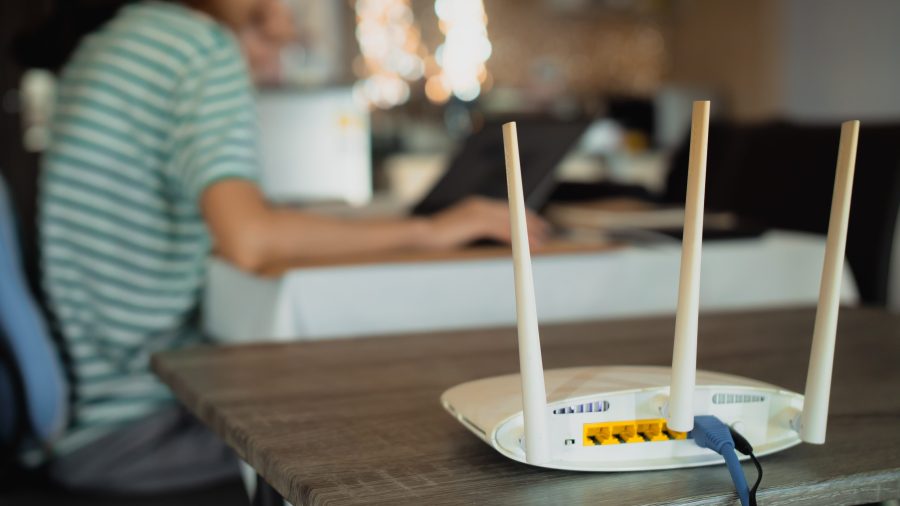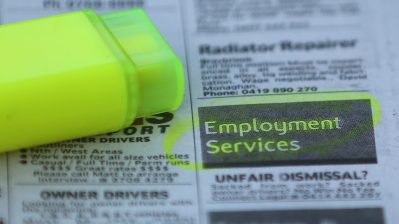Millions of Americans could lose home internet access next month

Back in the pandemic depths of December 2020, when so many Americans were working, learning and performing essential daily tasks online, the Federal Communications Commission launched an emergency program to help low-income people connect to high-speed internet with a $50-per-month subsidy.
That was extended with the Affordable Connectivity Program, which has provided $30 a month for internet service. An estimated 23 million households currently get the subsidy. But they won’t for much longer.
Efforts to renew funding for the ACP have stalled in Congress and are expected to run out by the end of the month. Marketplace’s Meghan McCarty Carino spoke to Kelcee Griffis of Tech Brew about her reporting on the ACP and the people who rely on it.
The following is an edited transcript of their conversation.
Kelcee Griffis: The Affordable Connectivity Program came of age during a time when we were having this national wakeup call about how important the internet was to our daily lives. It was a time when a lot of us were forced into our homes and forced to spend a lot of time away from our offices and the places that we typically would have been connected. A lot of people realized then that they didn’t have the bandwidth, they didn’t have the level of service that they needed to continue their daily lives. For many people, the ACP has allowed them to have internet access at home for the first time, and I think that’s important because we can’t do everything that we need to do on our cellphones. We can do a lot. But it’s hard to file a school paper, it’s really hard to do homework, it’s really hard to complete tasks, it’s really hard to apply for jobs if you’re doing this all on a small screen. So, the ACP became one of the first programs, possibly the first program, to get this many Americans connected to a higher tier of service and with enough money available so that they could actually have home internet of the caliber needed to carry on all of those daily activities.
Meghan McCarty Carino: Among the people that you spoke to for this story who have benefited from this program was Dorothy Burrell. She’s a Kansas City resident, she’s a lupus patient, and you write that she couldn’t afford home internet until she enrolled in the ACP two years ago. She’s one of those folks who did not have home internet before. And she told you a bit about how she’s been able to use the internet since then. Let’s listen to what she said.
Dorothy Burrell: It’s very important because it gets to the point sometimes when I have a flareup and I can’t really get out of bed. And when I call my doctor, they’d be like, well we’re going to do a virtual appointment with you. And if I’m feeling depressed or anything, I can reach out to the Essential Families program and get connected to telehealth or mental health specialists, anything like that that is needed.
McCarty Carino: Kelcee, what else did you hear from Dorothy and the other people you interviewed about how they were using this program?
Griffis: So obviously, we know that having home internet access opens all kinds of doors for connecting with doctors, connecting with mental health specialists like Dorothy told me, but it also opens up avenues for searching for jobs. That’s actually one thing that Dorothy was also using her internet connection for. She was looking for work that she could complete remotely, and she actually told me in a followup interview that she had found work as a digital navigator for the Affordable Connectivity Program and other digital access programs in her area. So, she was going to become a peer guide to help other people gain that access that she had found so valuable.
McCarty Carino: There has actually been bipartisan interest in renewing this program. What has gone wrong?
Griffis: Yeah. I think there has been this bipartisan recognition that Internet access is so vital. And it’s not just a Democrat or Republican issue. When you look at the demographics, a lot of these Republican districts are very rural, and those residents really need that support the most. So, I think right now, there’s a bill that would renew this program through the end of the year. But so far, it hasn’t gotten a House floor vote that would get it closer to becoming a law. So, there’s a petition out right now that would force the House speaker to bring that up for a vote. But again, we don’t really know where that’s going. There are also some other longer-term efforts to sort of fold the funding for this program into other mechanisms, but that takes a lot of diplomacy and a lot of politics to make that happen. So, it seems like at least in the near term, there’s not really a solution that’s going to continue this program through the end of the year.
McCarty Carino: We are now a week into May and the program is set to run dry at the end of this month unless there’s some sort of last-minute funding approval from Congress. What happens now for the people who use this program?
Griffis: I’ve heard that people don’t really know what to expect, people don’t know what’s happening with their benefit. Some people are losing connectivity and maybe didn’t realize it was going to happen to them. So, it’s very jarring from the customer side, even if these customers should have or did receive notice previously. So right now, the customers have access to a downgraded benefit, and it is $14 a month, so they likely are paying more than their subsidized plan would have paid a month ago. And then next month the program will have fully run out of funding, and people will be paying the full amount for their service. And that’s important to know because the FCC conducted a survey in December, and they found that 77% of respondents reported that they would not be able to continue receiving internet access if they lose access to the ACP. So that means people would either have to downgrade their plan or they would have to cancel their service altogether.
McCarty Carino: And what about Dorothy Burrell in Kansas City? Did she tell you what she would do if she lost the subsidy?
Griffis: She told me quite frankly that she would be depressed if she lost her internet access. Luckily, because Dorothy found a job and she has worked through this connectivity organization, she will be able to continue paying her internet bill if the ACP goes away. But millions of Americans will not be so lucky.
McCarty Carino: Are there other programs that could help bridge the gap if the ACP goes away? For instance, last summer, President Biden announced more than $40 billion in funding for broadband programs. Could that help people who are losing their ACP subsidy?
Griffis: That’s a really interesting question. So, the $42 billion that was announced for high-speed broadband funding very notably goes to the infrastructure side. So that is to help internet service providers make a business case for serving these areas that maybe are very expensive to build service out to otherwise. So, the $42 billion was supposed to go hand in hand with an affordable connectivity initiative, like the ACP. So, I think it’s really a big piece of this conversation that sometimes gets lost in the mix is that this high-speed internet infrastructure grant only works if people can also afford to buy the service once it’s been built out to them.
In our conversation, Kelcee Griffis mentioned the Lifeline program — also known as Obama Phone — that’s sort of adjacent to the ACP, which could provide some assistance to low-income people in getting connected online. It’s not funded by congressional action, but by a surcharge on telecom service, and it provides those who qualify with free mobile phones and limited voice, text and data plans.
But as Griffis pointed out, mobile devices aren’t always a great replacement for home internet when it comes to complex processes that continue to move online, like doing schoolwork, applying for a job or applying for social safety net programs.
The future of this podcast starts with you.
Every day, the “Marketplace Tech” team demystifies the digital economy with stories that explore more than just Big Tech. We’re committed to covering topics that matter to you and the world around us, diving deep into how technology intersects with climate change, inequity, and disinformation.
As part of a nonprofit newsroom, we’re counting on listeners like you to keep this public service paywall-free and available to all.
Support “Marketplace Tech” in any amount today and become a partner in our mission.


















